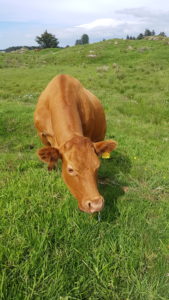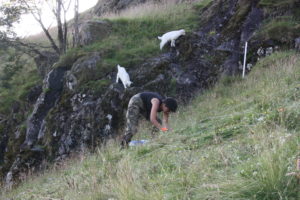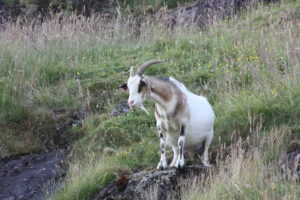 How does livestock management impact biodiversity, ecosystem functions and ecosystem services? How do different grazing regimes on summer dairy farms shape landscape heterogeneity and connectivity and how do they affect pollinator communities?
How does livestock management impact biodiversity, ecosystem functions and ecosystem services? How do different grazing regimes on summer dairy farms shape landscape heterogeneity and connectivity and how do they affect pollinator communities?
In this multidisciplinary project we investigate the relationships between human and nature in the scope of developing a sustainable management of land-use and natural resources in the Nordhordland Biosphere area – Norway’s only Biosphere Reserve in UNESCO’s Man and the Biosphere (MAB) programme. Join us if you want practical experience in common field- and lab-methods in applied ecology and to be a part of an ambitious and enthusiastic team!
Project description
TradMod is a project that started in 2018 and had its first field season in 2019. We study land-use change, especially in relation to livestock grazing management, and investigate how ecosystem functions and -services are affected by the transition from traditional resource use to modern industrial production in the Nordhordland biosphere area in Western Norway. Our study area span from the outer coast in the west, through coastal- and fjord-landscapes to the mountains of Stølsheimen, and down to the magnificent Sognefjord.
We collect data in the field and in the lab and through close interaction with farmers and other stakeholders in Nordhordland. In the field we conduct detailed surveys of ecosystem components (e.g. plants, arthropods and soil) in different grazing regimes throughout the study area. We also have one experimental study to distinguish the different components from sheep grazing and study the effects they have on key ecosystem functions and -services. In the lab we process and analyse samples collected in the field in order to quantify biodiversity and ecosystem functions and -services.
Read more about the project here: https://www.uib.no/en/rg/EECRG/120534/tradmod
Tasks
 Field-tasks:
Field-tasks:
During the field season (from mid-June to mid-August) we go out 4-5 days a week, either to conduct ecological surveys in different sites each day, to work in our experimental site in Øygarden, or to do a landscape-scale pollinator study on summer farms (starting in summer 2020). Because we sample a wide range of biological and environmental parameters to investigate key ecosystem components, the tasks in the field are many and varied. It is possible to focus on just one or a few things if you have a specific interest, or you can get experience with many different tasks. Here are some examples of work we do in the field:
– Study design: You can learn about different ways to collect data in the field – we conduct ecological field-surveys and a field-based experiment.
– Vegetation analyses: Species identification and estimation of cover of vascular plants and bryophytes.
– Field sampling of arthropods: We use pitfall traps, a mesofauna corer and a modified Leaf Blower-vac to collect arthropods above the ground and in the soil.
– Soil-parameters: We measure soil penetration directly in the field and collect soil cores to measure several different soil-parameters in the lab. We also use tea bags (‘Tea Bag Index’) to measure soil decomposition rates.
– Vegetation biomass: We collect above- and belowground plant biomass to measure plant productivity.
– Pollinators: During the summer 2020 we will map habitats around summer dairy farms and collect pollinators several times throughout the season.
 Lab tasks:
Lab tasks:
During the rest of the year (mid-August to late April) we work in the lab to process collected samples. Typical lab tasks include:
– Arthropods: Taxonomical sorting of collected arthropods, and the possibility to focus on specific groups for species identification.
– Soil-parameters: Learn common ecological lab-methods for measuring different soil-parameters like bulk density, water holding capacity, organic content, decomposition rates and carbon- and nitrogen content.
– Plant productivity: We process vegetation biomass sampled above ground and from soil to measure plant productivity within different functional groups.
– Pollinators: Taxonomic identification of pollinators collected in the landscape-scaled pollinator study.
We have a wide selection of tasks available. Do you like the project, but you do not find any specific tasks that are relevant for you? Do not hesitate to contact us – there might be other aspects of the project that suits you more.
The project involves: labwork & fieldwork
Starting date/period: 2 Sept 2019 – 17 Dec 2021.
Experience
By joining TradMod, you will learn a wide selection of practical skills that are valuable in ecological research and transferable to other disciplines – for example how to link scientific research to practical landscape management.
You will learn common methods for field- and lab-based data collection in ecology (e.g. measuring physical, biological and chemical soil properties, quantifying biodiversity of plants and arthropods and measuring biological productivity) and learn how the biological and environmental parameters we collect/measure are related to ecosystem services. You will also obtain knowledge about how changes in land-use and grazing management affect key ecosystem functions and -services.
Involvement
Max 40 hours. The work load and structure is flexible and depends on the specific tasks. In the field it is most convenient to join one full week (Mon-Fri) anytime during the summer, but other solutions are possible (e.g. 2-3 days/week for 2 weeks). Lab work can be from 3 hours/week during one semester to one full week (Mon-Fri)
Interested by this project? Need more info? Contact Linn Voldstad (linn.voldstad@uib.no)
Project number: 019

1 thought on “Domestic grazing animals as landscape engineers: Effects on biodiversity and ecosystem service provisioning in Nordhordland”